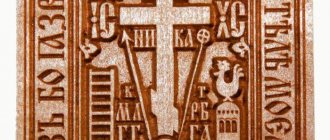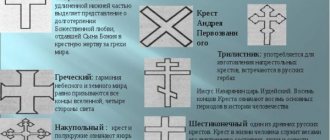Origin and meaning of the word
What is blasphemy in Orthodoxy? This word is known to everyone and is often used even in joking conversation, but what does it really mean? Its closest synonyms are the words “outrage”, “sacrilege” and “blasphemy”. Different dictionaries interpret blasphemy differently:
- Wikipedia:
- mockery of a person, which consists in ridiculing his expensive and important things;
- insult to religious feeling or shrine.
- Modern dictionary:
- insulting the feelings of believers;
- desecration of a dear and revered object for someone.
- New dictionary:
- an insult to something sacred for believers.
- desecration of something revered.
- Great Encyclopedia of the USSR:
- mocking attitude towards the subject of faith;
- mockery and ridicule of people's memory, discoveries of science and art, human exploits, morality, etc.
- Explanatory dictionary of the Russian language
Under the rule of the imperial family in Russia, blasphemy was equated, just like blasphemy, with a crime against faith. Despite the fact that these concepts can be explained quite widely.
What is Blasphemy - The meaning of the words Blasphemy, Blasphemy
Koschyuny (to blaspheme) - in the old way it is written this way, and not with the letter “u”. Over the past few centuries, not only has the history of the Russian people been rewritten many times, often by invited foreign “learned” men, but the Russian language has been changed, distorting the true meaning of its words.
The same approach of representatives of foreign religions was manifested equally in relation to the mythological images of ancient Russian fairy tales, epics, and legends.
Over time, the imprint was left on the people's consciousness, which manifested itself in a specific way in the works of people who studied the Russian Tradition:
“Christian shepherds not only strengthened with their authority the ancient opinion about the connection of witchcraft with evil spirits, but also gave this opinion a more decisive character. As accomplices of evil demons, people rebelled against sorcerers and witches only in extreme situations of public disaster; in ordinary times, he trusted and respected their prophetic gifts and willingly used their help. On the contrary, Christianity looked at all manifestations of witchcraft with indifference; in his stern opinion, the thieves of rain, the instigators of hail, whirlwinds, and diseases, and the compilers of healing potions, scholars, soothsayers, and fortune tellers were equally sinful. From here arose many collisions that vividly depict our past life from its inner side.”
Similar clashes still occur today, although only at the level of interreligious and philosophical discussions.
Let's first look at V. Dahl's Explanatory Dictionary of the Living Great Russian Language:
“To blaspheme or blaspheme, to mock sacred objects, to speak of them with contempt, abusively, vulgarly; scold, defile, desecrate, talk nonsense, talk nonsense. Blasphemy cf. valid This. Blasphemy is the opposite of fanaticism, but even worse; desecration or desecration. Blasphemous, related to this. Koschun, blasphemer m. blasphemer, blasphemer w. who blasphemes; blasphemous - nobody's, peculiar to them. Koschun, from Reif, from Persian; at Shimkevich. he is not there; I think that this word is in connection with bone, caste, bone, kashchei, dirty tricks, dirty tricks, desecration, defilement.
To blaspheme, to begin to blaspheme, - sya. forget yourself blasphemously, exceed all measure.”
So, no more, no less - “blasphemy is the opposite of fanaticism, but even worse.” At the very least, it is doubtful that the Slavs, who revered their Gods and Ancestors, would in advance and in a special way begin to invent such a sophisticated word for “desecration or desecration, mockery of sacred objects,” as V. Dahl writes.
It is obvious that in his dictionary Dahl conveyed the latest meaning and meaning of the words koschyun, to blaspheme. In such a situation, the question arises: to what extent do you need to reject the traditions and culture of your ancestors in order to similarly enhance the negative emotional impact on the reader of the dictionary of the “living Great Russian” language? There is only one answer: to the extent that it is beneficial for those interested in desecrating the ancient primordial worldview of the Slavs - political intrigue and the thirst for power over human minds even in ancient times were a characteristic distinguishing feature of “catchers of human souls.”
What does the word koschuna actually mean? Let us present the results of research on the true meaning of this word:
“Each people at the beginning of its history is given (or it itself manages to create as a result of the intense work of the spirit) a unique revelation about the world around it and its own place in it. The name of this wonderful revelation, which for centuries determines the unique spiritual appearance of this people, distinguishing it from all other peoples, is myth. It gives the people who created it a holistic and all-encompassing sense of the world - knowledge of themselves and the surrounding material and spiritual Universe in all the countless diversity of their connections and mutual influences, not only on the intellectual, but also on the intuitive level.
The Old Russian language well emphasized this role of myth, which our distant ancestors denoted with the word koschyuna.
The Koshchyuna myth was organically associated with magic, and after the forced baptism of Rus', the preachers of the new faith categorically forbade their flock even to listen to native legends: “Listen neither to enchantments nor to blasphemous magic.” Semantically, this designation of myth in our language is related to the words kosh - “lot, fate” and koshchnoe - the other world where the pagan gods were. Thus, according to the ideas of our distant ancestors, forever reflected in their language, the performed koschyuna connected a person’s life not only with another, otherworldly world, but also with his destiny.
Outstanding domestic scientist V.Ya. Propp wrote about this unique phenomenon of spiritual life:
“A myth is a story of a sacred order. In reality, the story is not only believed, it expresses the sacred soul of the people.”
The famous Swiss psychologist K.G., who studied the myth from a completely different position and with completely different methods. Jung came to an almost similar conclusion, noting the terrible danger of the people losing their own myth:
“Myths are the original manifestations of the preconscious soul, involuntary statements about events in the unconscious psyche, but least of all allegories of physical processes. Such allegories would be idle entertainment for the unscientific intellect. Myths, on the other hand, are of vital importance. And if a tribe loses its mythological heritage, it immediately disintegrates and decays, just like a person who would lose his soul. The mythology of a tribe is its living religion, the loss of which – always and everywhere, even among civilized peoples – is a moral catastrophe.”
With the adoption of Christianity, the clergy in Rus', as in most other countries, did everything to destroy the people's memory, to break this sacred connection, and this root in their mouths acquired a different, directly opposite meaning of blasphemy, that is, sacrilege. In fact, as we see, it was the zealous preachers of the new faith who committed sacrilege against the soul of their people.”
There are also slightly different, but consonant versions regarding the translation of the word koschyuny.
The most important activity of the Magi was the inheritance of diverse ritual folklore, the origins of which came from the distant depths of primitiveness. Thanks to the careful preservation of traditions, echoes of verbal creativity survived in Russia until the 19th century, before their meeting with ethnographers. Translations from Greek allow us to determine how some words were translated into Russian, for example “koschyuny”, “fables”.
Koschyuny and fables are close concepts, but not identical: “Inii hum (play on bowed instruments), inii beat him and koschyunyat.” To swear, fables say, probably refers to different types of oral literature, and this action is subject to much less attack by clergy than koschyuny, from which the modern word “blaspheme” comes, i.e. violate the shrine. In fables, obviously, there is more secular, everyday (but not epic), and in koschyuns there is more pagan, mythological, what seemed especially “blasphemous” both to the church fathers of the 4th - 7th centuries, and to the Russian clergy of the 11th - 14th centuries.
Koschun myths are clearly contrasted with true historical narratives. Church writers of that time believed that it was necessary to “tell stories in the place of glorious deeds,” i.e. preferred epic to myth. There were storytellers of myths - blasphemers, to whom people flocked, despite the prohibitions.
Koschyuns were performed during a funeral service for the deceased. They were allegedly performed “for the sake of vanity,” i.e. The one over which some mythological legends were sung was considered a special funeral pie.
The key to penetrating the half-forgotten world of ancient Slavic mythology can be the widespread and stable image of Koshchei the Immortal, whose very name contains an indication of the mythological archaism of “koshchyun” and the connection with the infernal essence of the “koschey”, otherworldly kingdom. The magical East Slavic fairy tale was called mythological by researchers for a long time, until the Ukrainian ethnographer N.F. Sumtsov did not express serious doubts about the possibility of scientific knowledge of Slavic mythology: “The boundaries of mythology hang in the air; there has never been anything strong and stable here, and now, with the current state of folklore, mythology has no definite content.”
So, we looked at the interpretation of the words koschyuny, koschyunit as a kind of synonym for the word “myth” and everything connected with it. However, in addition to the mythological aspect and the “current state of folklore”, which N.F. talks about. Sumtsov, among the Slavs, almost every word or name had a purely practical, everyday meaning. The true natural power of our Ancestors lay in the ideal combination of the mythological and the real in the everyday life of the Slavs. Why this most important aspect - the interaction and combination of myth, life and everyday life - is completely overlooked or simply ignored by some researchers remains a mystery. How can you not notice something that is constantly in everyone’s sight, but is only covered by a thin layer of so-called “civilization” as a result of the destructive activities of these same “civilizers”!
It is not surprising that even the most honest and meticulous researchers during their searches were able to see only a part of such a rich heritage of our Ancestors. The main task in restoring, preserving and enhancing folk culture is to reveal as fully as possible the spiritual relationship of the Russian people with their ancestral traditions.
So we come to another important component of our spiritual heritage, namely, the everyday side of the use of words, names and titles.
What does the root “kosh” (“kosh”) mean in the word koshchyuna? In the old days, this was the name for a braid, a bundle, a lace or rope, or a headband. The name of one of the main Goddesses of the Slavic pantheon is Makosh - the Spinning Mother. The goddess who spins the thread of life for the whole world. And her two daughters Dolya and Nedolya knit various knots on that thread, some for good luck, some for bad luck. And even the gods obey those knots on the thread of life.
“What kind of knots are on the threads? This is where we find the most interesting things. Remember the saying: “a knot for memory” - the custom of tying the edge of a scarf so that, looking at it, you will remember something important. Nice custom, you say. Nothing happened. These are echoes of a time when there was no written language yet, but there was already information to remember. When bartering, trading, and contracts, certain “credentials” were necessary. Therefore, for example, a cord was woven on which various knots were knitted (in ways known only to a certain tribe). The number of nodes was equal to the number of tribes participating in the treaty. A kind of “author’s signature”. This cord was kept by a trusted person, leader, sorcerer, etc. And in order not to forget the contents of the contract, the “kosh” turned around and was worn on the forehead (head).
The system of knotted signs was improved and turned into one of the varieties of writing. The best preserved version is known to us as the writing of the Peruvian Indians “Quipu”.
So, kosh is a braided piece of information that was used to tie braids and keep them for selected people. The attitude towards these persons was very, very taboo. Only a limited circle of people could communicate with them. Causing harm to them was punishable by the maximum penalty: death or expulsion from the tribe. When conducting military operations, such people were inviolable, for the same reasons.
Look at the whimsicality of Khokhloma patterns, at the uniqueness of the knots on the headbands of girls’ headdresses. Beauty! Not only that. Even at the beginning of the last, 20th century, all these patterns were read by local residents like an ordinary book, a passport. What village, what family, the name of the weaver, her marital status, number of children, whether she is happily married and a lot of other information.
In Slovenian languages there are still preserved words with the root “kosh” - in the sense of wickerwork: wallet, purse, koshara - a wicker fence for livestock. Remember the Koshevoy seine or the Koshevoy Ataman (i.e., the Chief in a certain group bound by certain obligations).
The verb “koshtuvati” means to weave. By the way, slander and rumors are called another copy of the word “Kosh” - gossip.
When baptizing Rus', the first thing was to deprive the people of their own history.
The easiest way to do this was to the cats and kill the human guardians. So that they do not contradict the “official” religious dogma, they do not blaspheme. Naturally, the keepers tried to leave and take their knowledge away to closed, hidden, deserted places. For such cases, apologists of Christianity used ordinary slander and gossip, which diligently denigrated and desecrated the keepers of the koshas. I don't think life in remote places was sweet and abundant. Only initiates and especially trusted persons knew the places where the guardians were hiding. Therefore, it is unlikely that the keepers were particularly well-fed. And the guardians were no longer young in age. Hence the attitude towards the guardians was as equal to God or, subsequently, as God!”
In this case, the persecution of the new official church against the keepers of ancient knowledge and traditions and the distortion of the language of our ancestors become easily explainable.
Source
Blasphemy and blasphemy in Orthodoxy
Today the word “blasphemy” has many synonyms, but earlier, before 1917, they all had a specific meaning. For example, “sacrilege” was used to describe the terrible acts of barbarians - robbing graves and sacred temples, which violated all moral laws.
But “tatba” is theft or crime against church property. This is where “blasphemy” came from, that is, the theft of a sacred thing in 1653, when the word began to mean in general a religious crime in the same way as “blasphemy.”
“Blasphemy” initially defined a disrespectful attitude towards church rituals and the rules of Christianity. Today these are all related expressions that speak of a violation of morality and disrespect for faith.
How should an Orthodox person react to blasphemy?
What is blasphemy in Orthodoxy and how should a believer react to such behavior? The noun “blasphemy” is also a verb (to blaspheme), having the same meaning - an action that offends the feelings of religious people.
Important! According to Scripture, a blasphemer is one who is a defiler and a mocker. A blasphemer in Orthodoxy is a person who is disdainful and sarcastic against the object of worship and veneration of another person. Anyone who “sows” slander, mocks and ridicules, does not properly perform the rituals established by the church or does not respect God’s word and commands.
They also highlight blasphemy against a person - disrespectful attitude towards the servants of the Church, causing harm, desecration by words or actions of a person serving in the field of God.
Such blasphemy may include:
- action against chastity;
- beating of a clergyman;
- holding ministers accountable according to civil laws, and not according to canons.
What does blasphemy mean to a believer? For any Orthodox Christian, the Lord is Lord, King and Father. He saved people through His Son Jesus Christ and He alone is revered. When someone allows someone to mock Him or speak insultingly about the Church and believers, all this causes pain to the Christian and, of course, offense.
On the spiritual life of an Orthodox Christian:
- Last Judgment
- Does man have a soul?
- Why does my soul hurt and I want to cry?
No one wants to be insulted and slandered relatives, family, dear people and things, but some people consider it their duty to humiliate another. Christianity is a religion of love, it was Christ who commanded people to “Love your neighbor as yourself,” and in this commandment there is no exception for blasphemers and blasphemers.
Advice! Everyone should be loved. However, you should no longer communicate with such people or listen to them. It is worth asking the Lord for them and praying for their salvation, but in no case should you react verbally or, moreover, with your hands!
New in blogs
As we read the Word of God sequentially, we sometimes come across verses that we almost never hear preached on. But all Scripture is inspired by God and is useful for teaching and correction, for instruction in righteousness, so that we may become more and more like the perfect image of our Lord Jesus Christ. Thus, when reading the book of Proverbs of Solomon, we several times come across a description of a special kind of people whom Scripture calls blasphemers. Who are the blasphemers? Let's think about this topic. In the dictionary we find the following explanations:
Blasphemy – 1. Insulting a religious shrine. 2. An offensive attitude towards what is deeply revered, what is sacred and dear to someone.
A blasphemer is a mocker, a scolder, a desecrator, a blasphemer, a blasphemer, an arrogant villain.
Now let us cite several passages of Holy Scripture that speak of blasphemers:
Hosea 7:1-6
1. When I healed Israel, the iniquity of Ephraim and the wickedness of Samaria were revealed: for they act deceitfully; and a thief enters, and the robber plunders through the streets. 2. They do not think in their hearts that I remember all their crimes; now their deeds surround them; they are before Me. 3. With their villainy they amuse the king and with their deceptions the princes. 4. They all burn with adultery, like an oven lit by a baker who stops burning it when he has kneaded the dough and it has risen. 5. “The day of our king!” the princes speak, heated to the point of illness with wine, and he stretches out his hand to the blasphemers . 6. For by their deceit they make their heart like an oven: their baker sleeps all night, but in the morning it burns like a blazing fire.
Here blasphemers are characterized as: liars, thieves, robbers, robbers, villains, deceivers, adulterers. The king is accused of extending his hand to them.
Proverbs 3:34 If the scorners , He gives grace to the humble .
Proverbs 9:7,8 He who reproaches a blasphemer gains disgrace for himself, and he who reproaches the wicked earns himself a stain. Do not reprove the blasphemer , lest he hate you; rebuke a wise man, and he will love you; give instruction to a wise man, and he will be even wiser; teach the truthful, and he will increase knowledge. The beginning of wisdom is the fear of the Lord, and the knowledge of the Holy One is understanding;
Let us remember once and for all: you need to try to stay away from the blasphemer, because if you start lecturing him, you will definitely ensure disgrace for yourself. Never point out to a blasphemer his mistakes, just get away from him, because instead of accepting your accusations and correcting himself, he will hate you with fierce hatred.
Proverbs 19:25 If you punish a scorner , then the simple will become wise; and if you rebuke a wise man, he will understand the instruction.
The blasphemers do not accept reproof, instruction, admonition. The only means of influencing them (if you have power over the blasphemers) is punishment, which the blasphemers can still perceive and, to some extent, come to their senses through this.
Proverbs 19:29 are prepared for those who blaspheme , and blows for the flesh of fools.
God is writing a memorial book and the blasphemer will give an answer for all thoughts, words and deeds on the day of judgment if he does not repent.
Proverbs 21:11 When a scorner , the simple becomes wise; and when a wise man comes to his senses, he acquires knowledge.
A smart person learns from other people's mistakes.
Proverbs 21:24 An arrogant wicked man— a blasphemer —acts in the heat of pride.
Have you ever met such a person? Outwardly, he may appear to be a pious, God-fearing and decent person. Who knows its essence? Can a person of clergy be a blasphemer? This question itself may already be perceived by some as a kind of blasphemy! This is my pastor! Don't you dare talk about him!!! Unfortunately, there are cases when simple-minded and naive people are unable, due to inexperience, to analyze the actual deeds of their “idols.” Jesus Christ - God who knows the heart - proves to us that even among the clergy there are sometimes blasphemers - hypocrites and deceivers, once he publicly denounced them for all to hear. He said to them the following: Woe to you, scribes and Pharisees, hypocrites, because you are like whitewashed tombs, which on the outside appear beautiful, but on the inside are full of the bones of the dead and all uncleanness; So, on the outside, you seem righteous to people, but inside you are filled with hypocrisy and lawlessness,” “serpents, brood of vipers! How will you escape from condemnation to Gehenna?” Modern blasphemers, if anyone dares to doubt their righteousness, they can put them under pressure! They will certainly try to use all resources and means to slander and denigrate a person they dislike. This is exactly what they did with Christ. Let us remember the example about Ananias and Sapphira: how did the game of “righteous people” end for them? These thoughts of mine are not intended to throw a stone at someone’s garden: a thousand times NO, NO and NO!!! The purpose of these reflections is one: to remind us all of the Apostle’s call: to examine ourselves, are we in the faith? There is such a children's rhyme: This is what happens among us, among the chosen children: in words like oil, but in the soul - a Pharisee! But in the soul there is only vice, it is like a hellish stream, carrying bitterness and poison among the chosen children!
Proverbs 22:10 Drive away the scorner , and discord will be removed, and quarreling and fighting will cease.
Proverbs 24:9 The thought of foolishness is sin, and a blasphemer is an abomination to men.
Isaiah 28:22 Therefore do not blaspheme , lest your bonds become stronger; for I have heard from the Lord, the God of hosts, that destruction is determined upon the whole earth.
Have mercy on us, Lord! Test and see if I am on a dangerous path? Let these words from the Psalm be the prayer of each of us! May peace and grace from the Lord fill our hearts!
Balabanov Sergey.
www.sbalabanov.ru
Sin of sacrilege and blasphemy
Throughout its existence, the Church has been repeatedly subjected to insults and slander. If in the first centuries people who accepted Christ as their Savior were killed, crucified and put to death in any way, today they are trying to humiliate and insult their feelings.
How the Lord reacts to the sin of blasphemy and is there punishment for such people is an important question, but no less important is the question of how believers should respond to such actions?
At the last Council of Bishops of the Church in 2011, a program document was developed and adopted, which contains an action plan in the event of slander of the Church and blasphemy. First of all, it describes the differences between constructive criticism of the Church and insults to it. In particular, it explains what exactly is considered blasphemy - a conscious attempt to humiliate religious shrines sacred to Orthodox believers, expressed verbally or by specific actions.
Bishops' Council of the Church
That is, if humiliation is directed at a specific clergyman as a person, then this is not considered blasphemy, but if he is subjected to ridicule because of the faith that he professes, then this is already a sin of blasphemy, since the Holy Spirit, present in every believer, is humiliated.
Important! It should also be remembered that the Church is an organism, and by insulting one of its members, the entire organism is insulted.









